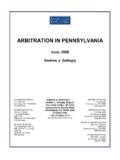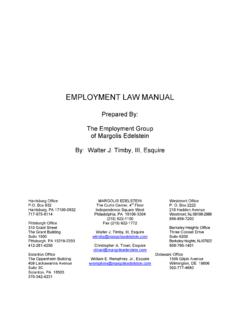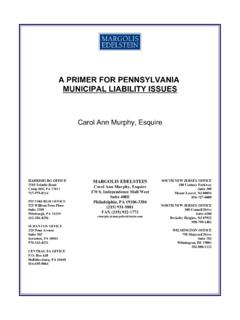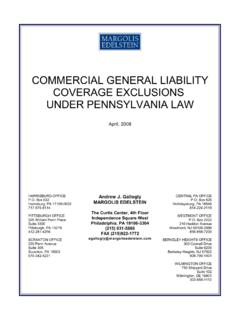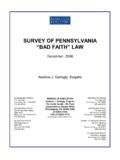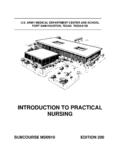Transcription of PENNSYLVANIA AUTO LAW - Margolis Edelstein
1 PENNSYLVANIAAUTO LAWW alter timby , EsquireHARRISBURG OFFICE3510 Trindle RoadCamp Hill, PA 17011717-975-8114 PITTSBURGH OFFICE525 William Penn PlaceSuite 3300 Pittsburgh, PA 15219412-281-4256 SCRANTON OFFICE220 Penn AvenueSuite 305 Scranton, PA 18503570-342-4231 CENTRAL PA Box 628 Hollidaysburg, PA 16648814-224-2119 Margolis EDELSTEINW alter timby , EsquireThe Curtis Center, 4th Floor170 S. Independence Mall 400 EPhiladelphia, PA 19106-3337(215)922-1100 FAX NEW JERSEY OFFICE100 Century ParkwaySuite 200Mt. Laurel, NJ 08054856-727-6000 NORTH NEW JERSEY OFFICE300 Connell DriveSuite 6200 Berkeley Heights, NJ07922908-790-1401 WILMINGTON OFFICE750 Shipyard DriveSuite 102 Wilmington, DE RESPONSIBILITYThe following coverages are mandatory, unless the otherwise insured party files aCertificate of Self-Insurance with the COVERAGE Every operator of a motor vehicle registered in PENNSYLVANIA is required to befinancially responsible.
2 Financial responsibility is defined as the ability to respond in damages for liabilityon account of accidents arising out of the maintenance or use of a motor vehicle in theamount of $15,000 because of injury to one person in any one accident, and in theamount of $30,000 because of injury to two or more persons in any one accident. B. FIRST PARTY BENEFITSE very policy of insurance covering a motor vehicle, including a bus, must providecoverage for medical benefits in the amount of $5, 75 PA. CS. 1711(a). Under PENNSYLVANIA s Motor Vehicle Financial Responsibility Law ( MVFRL ), firstparty, or PIP benefits must be made available for purchase, but coverage is notmandatory.
3 First party benefits include:(1) Medical Benefits - coverage for all reasonable and necessary medical treatment andrehabilitative service, with limits up to at least $100,000;(2) Extraordinary Medical Benefits - reasonable and necessary medical treatment andrehabilitative services which exceed $100,000, the coverage limits of which must befrom at least $100,000 to $1,100,000.(3) Income Loss Benefits - includes 80% of actual loss of gross income. $2,500 permonth to a maximum benefit of at least $50,000 must be made available;(4) Accidental Death - the available death benefit paid to the insured s personalrepresentative must be up to at least $25,000;(5) Funeral Benefits - $2, PENNSYLVANIA s modified no-fault system, any person who suffers injury arisingout of the maintenance or use of a motor vehicle is entitled to recover first partybenefits from the applicable insurance coverage in the following order of priority.
4 (1) for a named insured, the policy on which he is the named insured;(2) for an insured, the policy covering the insured;(3) for the occupants of an insured motor vehicle, the policy on that motor vehicle;(4) for persons not occupying a motor vehicle, , pedestrians, the policy on anymotor vehicle involved in the Pa. CS. 1713(a). Therefore, if a passenger owns a motor vehicle and is the namedinsured on a policy covering that vehicle, or is an insured under any other policy, hemust look to one of those policies, and not the insured s policy, for first party the bus passenger is the owner of a currently registered motor vehicle, but does nothave financial responsibility, he cannot recover first party benefits from any Pa.
5 CS. 1714. If, however, the passenger does not own a motor vehicle and is notcovered by any other insurance policy, then he may recover first party benefits underthe policy because that is the first applicable policy on the priority list under 1713(a).If the motor vehicle with which an insured vehicle is involved in an accident iscovered by an insurance policy, both the driver and his passenger(s) must look to thepolicy on that motor vehicle for First Party Benefits. If the motor vehicle is notpresently insured, the owner of the vehicle, if in the vehicle at the time, is barred fromrecovery of first party benefits from the vehicle in which they are a passenger, butthose who are not the owners are of Benefits - The MVFRL does not permit the stacking of limits of coveragefor first party benefits.
6 75 PA. CS. of Medical BillsAll healthcare providers bills must be forwarded directly to the insurer not to theinsured for collection. Two separate evaluations should be made of all bills receivedby the carrier. First, an injured person or the healthcare provider providing treatmentto that person (to whom plaintiffs right to benefits is generally assigned) may notreceive first party benefits in excess of 100% of the prevailing charge at the 75percentile of that rate pertaining to the service involved applicable under theMedicare program for comparable services. (If applicable, the measure against whichrecoverable benefits are made may be 110% of the applicable fee schedule, therecommended fee or the inflation index charge; or 100% of the diagnostic-relatedgroups ( ) Payment.)
7 75 Pa. 1797(a). Therefore, all bills should beindependently audited with respect to the amount , all insurers covered by the MVFRL are required to contract with a peerreview organization (PRO) for the purpose of evaluating treatment and healthcareservices provided a claimant. 75 Pa. CS. 1797(b). PRO evaluations are for the purposeof confirming services as reasonable and medically necessary. If an insurer intends tochallenge the reasonableness and medical necessity of treatments reflected in aclaimant s bill, it must submit its challenge to its PRO within 90 days of receipt of theproviders bill. If an insurer challenges a bill within 30 days of receipt, it need not paythe healthcare provider until a determination has been made by the PRO.
8 Otherwise,it is required to pay the bill, pending the outcome of the peer review. If the PROdetermines a bill is reasonable and medically necessary, the insurer must pay the billplus 12% interest per annum on any balance it withheld after the 30 days. If the PROdetermines certain treatment was not reasonable or medically necessary, and thecarrier has paid the bill, the provider must reimburse the carrier for any benefits paidplus 12% interest per annum thereon. If an insurer fails to submit a bill to a PRO andrefuses payment for that and future bills, the healthcare provider and/or insured maychallenge the insurer s refusal in Court. If the Court determines medical treatmentwas necessary and reasonable, the insurer will be required to pay the outstandingamount plus 12% interest, as well as the costs of the challenge and all attorneys considered to be wanton shall be subject to a payment of treble damages:NOTE: Because of the extent of potential exposure (attorney fees, interest, trebledamages), it is advisable to submit a claim to a PRO in almost all situations.
9 Also,firms that simply audit bills for compliance with 1797(a) ( , the amount of the bill)most often do not evaluate the reasonableness and necessity of treatment, andtherefore submission to such agencies will not satisfy & the requirement ofsubmission of bills to a Faith: The failure of an insurer to submit bills to a bona fide PRO (as opposed to amere auditing firm) is frequently the basis of a plaintiffs claim of bad courts have held, however, that the PENNSYLVANIA statute creating acause of action against an insurer for bad faith conduct is not applicable to actions fordenial of first party benefit under the MVFRL. Although the court may award, under42 Pa. 8371, interest, court costs, attorney fees and punitive damages against aninsurer found to have acted in bad faith toward its insured, only the remedies under1797(b) apply with regards to bad faith conduct for failure to pay first party benefitsunder the No right to subrogation exists with respect to BI benefits paid or payable between FirstParty Benefit providers.
10 75 Pa. There is a right of subrogation for an insurance company who pays workers compensation benefits to a person injured in a motor vehicle accident. Also, an ERISA plan that pays medical benefits is entitled to subrogation. Medicare, Medicaid andpayments made by the PENNSYLVANIA Department of Public Assistance are all subjectto subrogation. To the extent that subrogation is allowed, only the amount actuallypaid is recoverable, not the face amount of the bill. An example would be if there is ahospital bill for $10,000 and Medicare pays $6,000 to satisfy that obligation, theamount of the subrogation lien and the amount that could be presented to a jury forconsideration in a verdict is $6, is no right of subrogation or reimbursement from plaintiff s tort recovery withrespect to first party benefits paid or payable under any applicable policy coveringplaintiff 75 PA.
